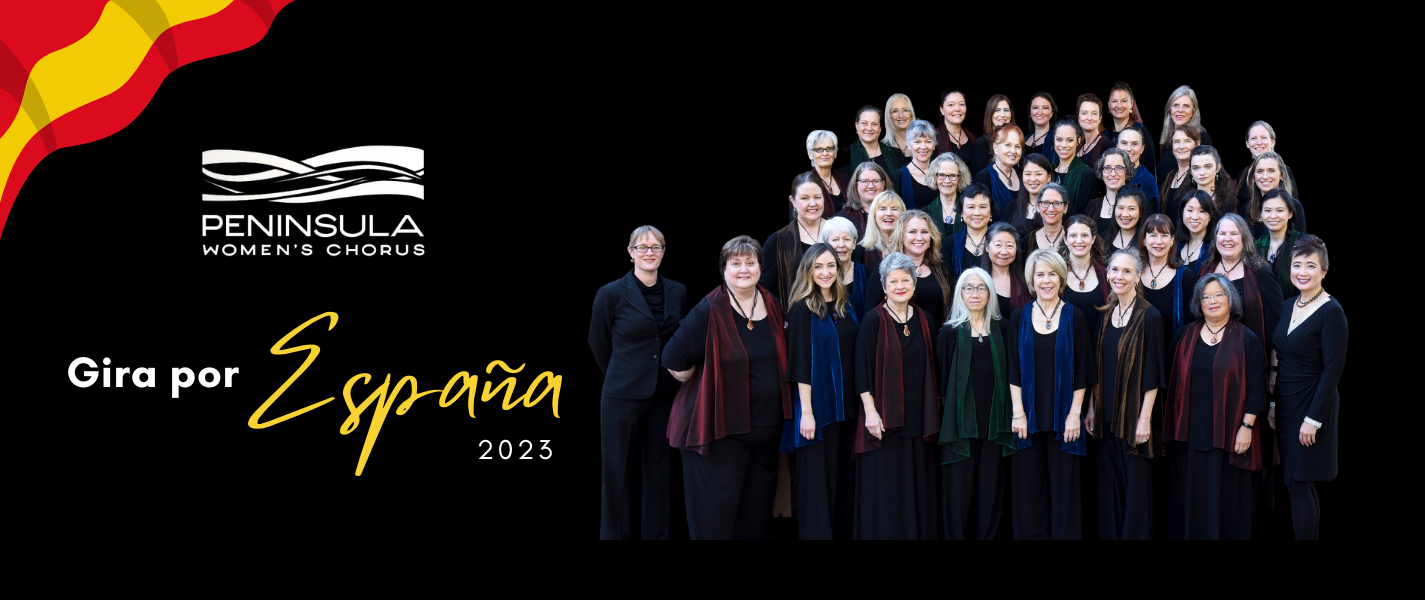Parròquia Mare de Déu de Betlem, C. del Carme 2, Barcelona
Iglesia San Pablo, C. de San Pablo 42, Zaragoza
Basílica de Santa María del Coro, 31 de Agosto Kalea 46, San Sebastián
Ticket Info:
• June 21: book your free ticket by writing to [email protected]
• June 23: no tickets required
• June 27: book your free ticket by writing to [email protected] with your name and # of tickets needed. Please identify yourself as friends/relatives of the performers.
Concert Program
- Stars in Your Bones
Joan Szymko
Joan Szymko is widely regarded as a leading composer of choral music in America today. She has been stirring up the pool of repertoire for women’s chorus for over thirty years as both a composer and conductor. The American Choral Directors Association recognized Szymko’s lasting impact on the choral arts in America by selecting her as the recipient of the Raymond W. Brock Memorial Commission in 2010. “Stars in Your Bones” is the third prose poem by Alla Bozarth that Szymko has set. Alla Bozarth is a poet and prose writer, a therapist and an Episcopal priest, and holds a Ph.D. in the performing arts and a certificate in Gestalt psychotherapy. She lives at the foot of Mt. Hood in Western Oregon. Her poems are widely used all over the world, often in collaboration with visual artists, singers, and dancers. Joan Szymko: “I am drawn to Ms. Bozarth’s imagery and to her universal expression of spirituality.”
- No Time
Arr: Susan Brumfield
- They May Tell You
Andrea Ramsey
Inspired by the singers in her treble choir, Isabella Cook wrote this poem when she was 17 years old. She hopes that when audiences hear her words they are inspired to view the women in their lives in a new light. She also hopes that women who hear or sing the song may feel freshly validated. Perhaps they might identify with one of the women presented in the text and realize they are worthy and good enough. Each stanza speaks to the resounding societal messages of unworthiness foisted upon far too many young women, highlighting specific items that Isabella has been told by others, whether it’s that she talks too much, is too ambitious, or is too opinionated.
- Anyone Can Sing
Andrea Ramsey
“When I first contacted the poet William Ayot for permission to set his stunning text, he was excited, kind, and gracious. I asked him about the poem’s origin—what inspired it, and his response completely shaped my compositional approach to the piece. I did my best to honor William’s story with the melodic content and musical painting of the text.” — Andrea Ramsey
“There are many elements to the writing of any poem. In this case, I had just been commissioned to write and read a poem at the new Shakespeare’s Globe Theatre for the 400th Anniversary of the very first performance of Shakespeare’s Julius Caesar. Reading the poem—alone on stage, without a mic, to an audience of about fifteen hundred people—had been a profoundly moving event for me. I was born without a roof to my mouth (no soft palate). My mother’s milk apparently ran down my nostrils when I was fed, and my parents were told that I wouldn’t be able to speak properly—and that I would never ever sing. So, having made my way through childhood neglect and abuse, adult isolation, breakdown, recovery and eventual redemption, I was ripe to appreciate the depth of the journey I had made—a journey that had brought me from a kind of hopeless grunting to ‘singing’ my own words alone on the stage of Shakespeare’s own theatre. The core of the piece is the line about descending to ‘the last dark hiding place’ and the ’empty’ core that we fear we will find when we begin to peel away the layered onion of our personalities… the tearing away of your pretences and defences until you are left with nothing to hide behind. There’s something about standing naked and ashamed that is both searingly painful and fundamentally redemptive… one is stripped down to one’s barest essentials and led back to life—reborn if you will—like the ancient bards and skalds.” — William Ayot
- To Burst To Bloom Theresa Wong
- The Moon Bridge Florence B. Price
- Esto Les Digo Kinley Lange
- Historietas del Viento
Alejandro Yagüe
“This is a wonderful suite of four Stories of the Wind by contemporary Spanish composer Alejandro Yagüe. The Spanish texts are by Federico García Lorca. Yagüe sets each poem in a delicate, miniature, through-composed setting for SSAA choir and, in a total of 9 minutes, the suite takes us through a wide variety of moods, textures and tempi. This is a mature piece that requires a high skill level of both vocal technique and harmonic understanding. I conducted these over two seasons with Elektra and always enjoyed rehearsing and performing them because there was so much scope to try to reflect the characters of the various types of winds, from stagnant, oppressive ones to playful breezes. We (Elektra) first learned this suite under the direction of Javier Busto, when we had him in Vancouver to conduct Elektra in a concert called Songs of Sanctuary, of which half the repertoire was Spanish, brought by Busto for us. My understanding is that Busto asked Yagüe to write this work specifically to be premiered by Elektra that year.”
— Morna Edmundson, Artistic Director, Elektra
- Ach! Synku Synku
Arr: Donald Patriquin
- Nana de Ángeles Eva Ugalde Álvarez
- Kulun Kulunka Eva Ugalde
- Shine on Me
Rollo A. Dilworth
Arr: Rollo A. Dilworth
Like many African-American spirituals, the melody of “Shine on Me” is built on a pentatonic scale, and it utilizes a text that has multiple meanings. The original text of this spiritual can be found in the opening chorus: Shine on me, Shine on me. I wonder if the lighthouse will shine on me.
The second line of the text metaphorically represents a search for guidance and direction on both a physical and a spiritual level. The additional text and melodies in this arrangement are partnered with the original melody so as to create harmonic progressions consistent with the African-American singing tradition.
- Libertango
Astor Piazzolla
Arr: Oscar Escalada
- Crowded Table
The Highwomen
Arr: Andrea Ramsey



